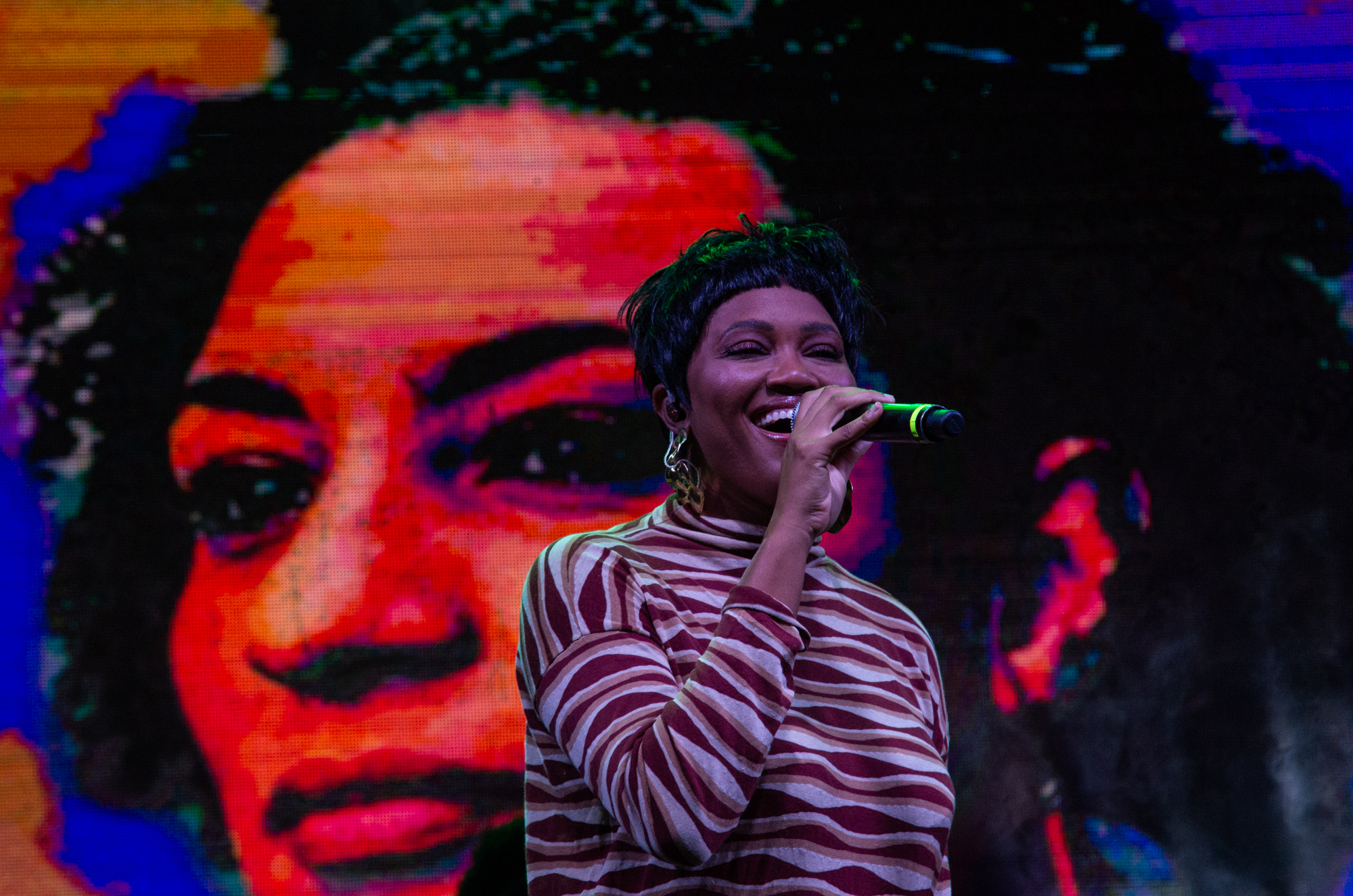
On March 14, the Marielle Franco Institute held the Justice for Marielle and Anderson Festival in Praça Mauá, downtown Rio de Janeiro. The event aimed to ensure the assassination of City Councilor Marielle Franco and her driver Anderson Gomes—which happened five years ago and remains unsolved—isn’t forgotten.
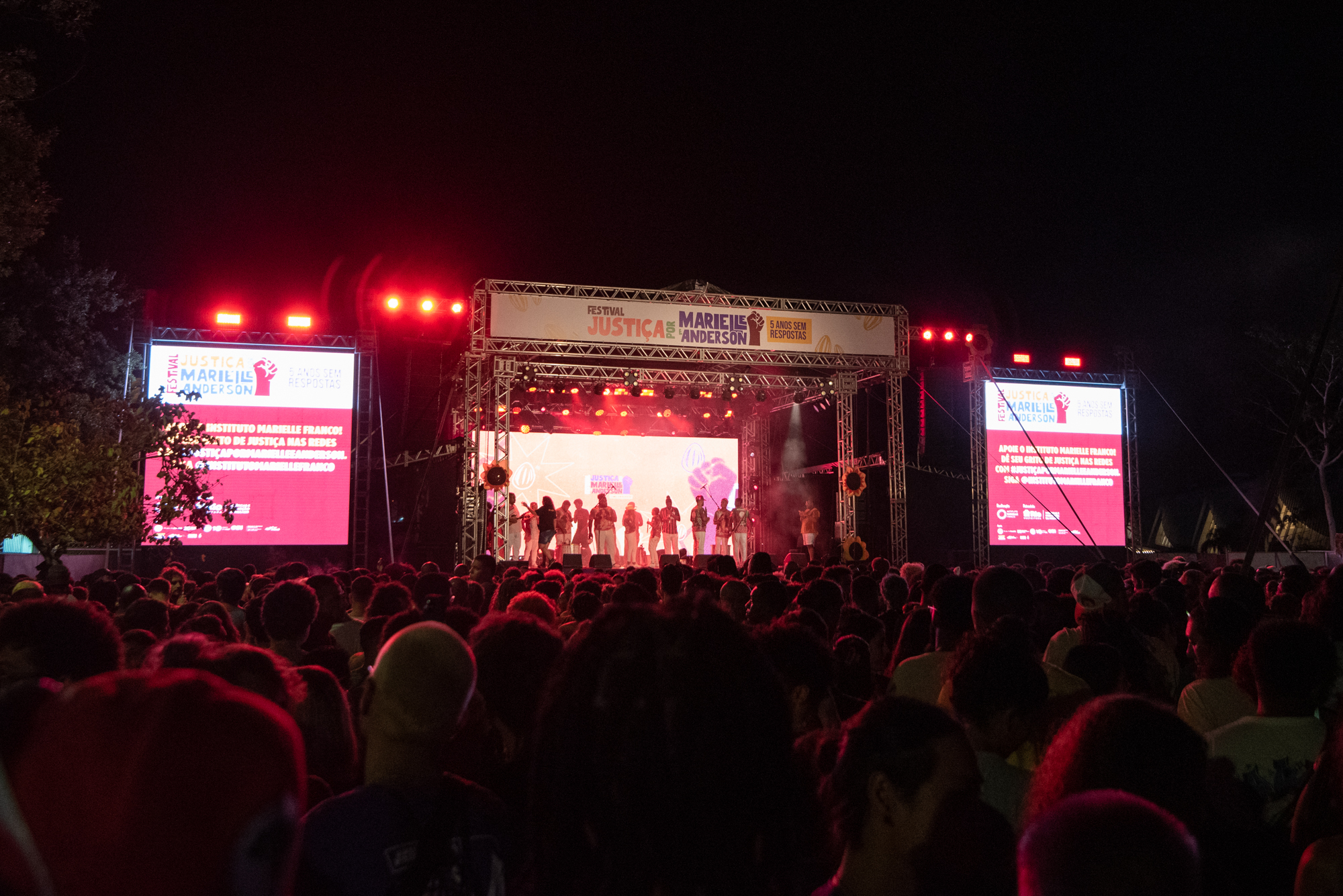
Marielle Franco was a sociologist with a master’s degree in public administration. She was elected to the Rio de Janeiro City Council with 46,502 votes. As president of the Council’s Commission for the Defense of Women’s Rights, she fought for the rights of Black women and LGBTQIAP+ people until her execution on March 14, 2018, in a political attack during which 13 gunshots hit her vehicle, killer her and her driver, Anderson Pedro Gomes.
The Justice for Marielle and Anderson Committee—comprising the Marielle Franco Institute and her family, the mandate of Marielle’s widow Mônica Benício, Anderson Gomes’ widow Agatha Reis, Global Justice, Terra de Direitos, Black Coalition for Rights, and Amnesty International—was created to closely follow every step of the investigations, resisting attempts to interfere in the case, and coordinating actions around the world to demand justice.
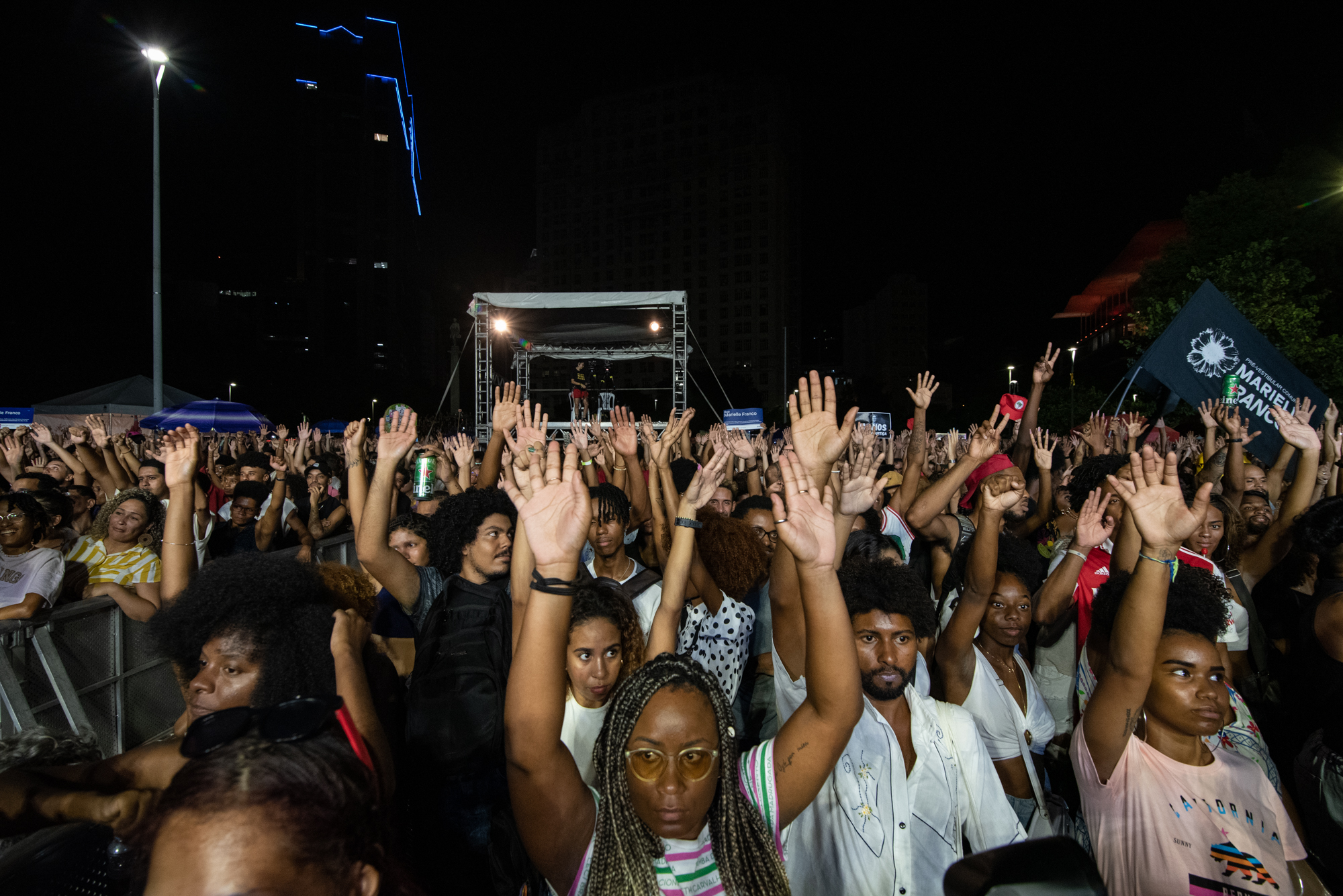
Two people were arrested in March 2019 for the double homicide of Marielle Franco and Anderson Gomes: Ronnie Lessa, a retired military policeman, and Élcio Queiroz, a former military policeman. They are accused of committing the crimes and are currently detained while awaiting trial by jury. The case was neglected by the Bolsonaro administration and gained momentum again at the beginning of Lula’s term, with Lula appointing Marielle’s sister, Anielle Franco, as Minister of Racial Equality. In February of this year, Flávio Dino, head of the Ministry of Justice and Public Security, ordered the Federal Police to open an inquiry to investigate “all circumstances surrounding the offense.” However there has been no new information in relation to the masterminds of the crime. The federal investigation is being kept under lock and key.
The Justice for Marielle and Anderson Festival started at 6pm, with performances by artists Marcelo D2, Djonga, Luedji Luna, Bia Ferreira, Azula, Baile Black Bom, Deize Tigrona, DJ Tamy, Abrona and Shury, Bateria da Mangueira and Marina Iris, Orquestra Maré do Amanhã, Nenhum a Menos, the choir Talentos do Morro, and a special guest performance by Criolo.
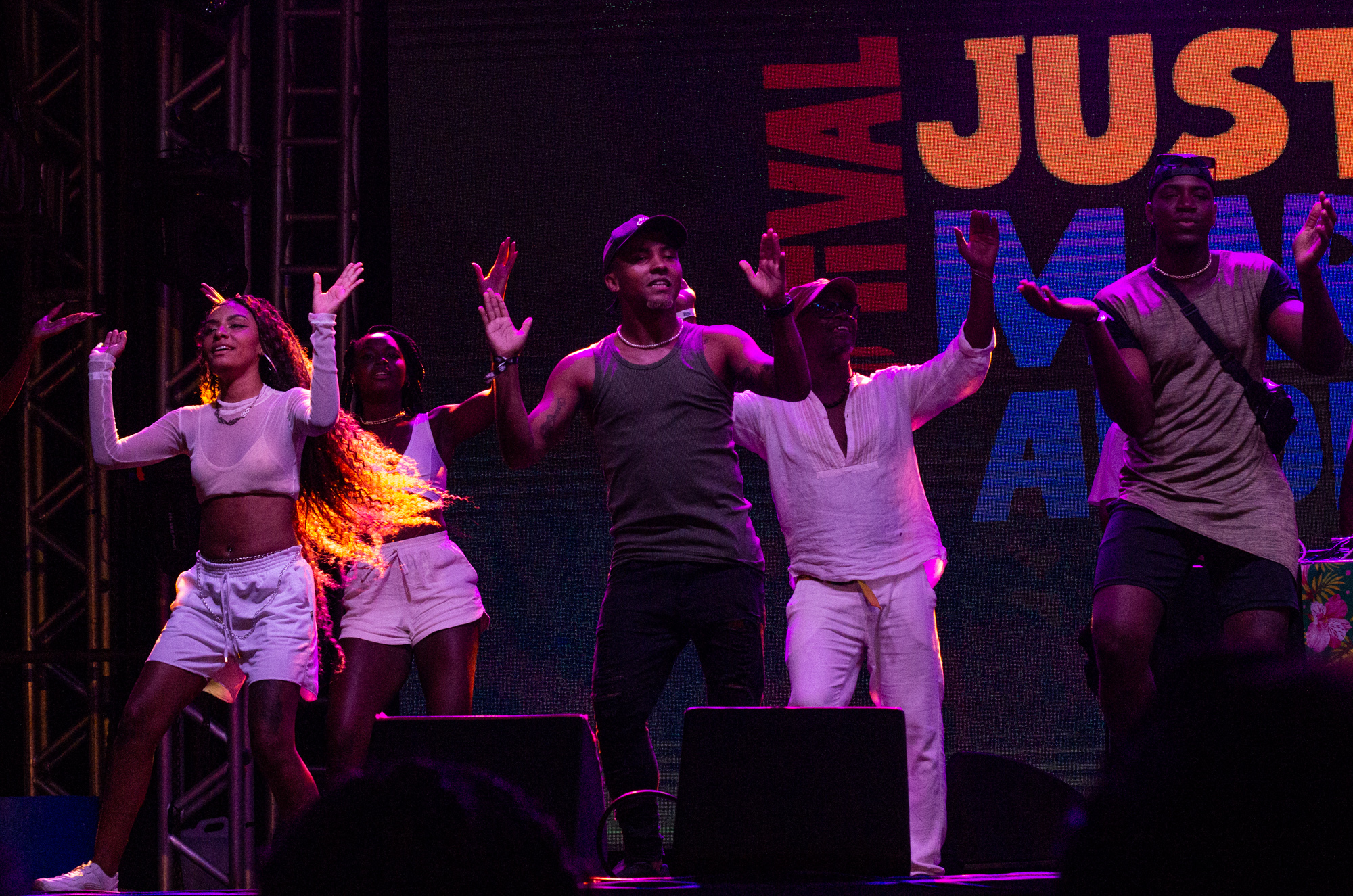
Marielle’s family stood up to talk to the press at around 6pm. Minister Anielle Franco reflected on being there to mark the longing, struggle, and pain after five years of suffering in search of answers. She revealed she’d taken part in a ministerial meeting with Lula in Brasília that very morning of March 14, in which the president reinforced the federal government’s and Justice Minister Flávio Dino’s commitment to the investigation and final resolution of the case. And that this is all heartening, as it has taken five years for a president to provide this support to the two families.
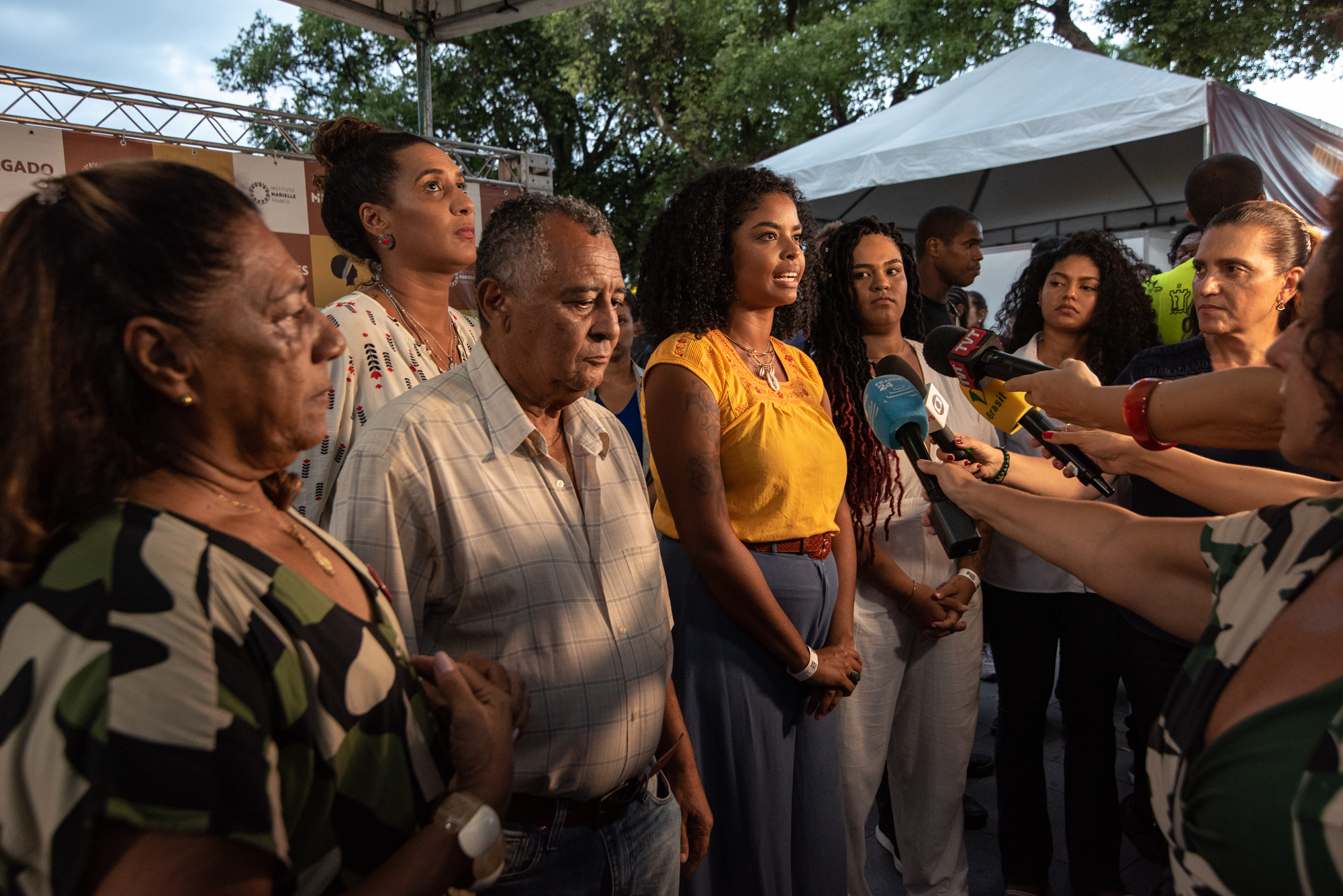
The new executive director of the Marielle Franco Institute, Ligia Batista, was also introduced to the audience at that time. Batista emphasized the importance of the current political moment. She shared that the institute, along with other organizations that make up the Justice for Marielle and Anderson Committee, have held several meetings over the last few weeks with the Public Prosecutor’s Office, Federal Police, and the Supreme Court (STJ) to highlight the need for answers and demand the authorities’ commitment to the investigation. They also requested that the families’ legal representatives have access to the investigation records. These efforts are all necessary because, in five years, those who ordered the killings have still to be identified. After the press conference, the festival began with performances by Orquestra Maré do Amanhã, Nenhum a Menos, and Talentos do Morro.
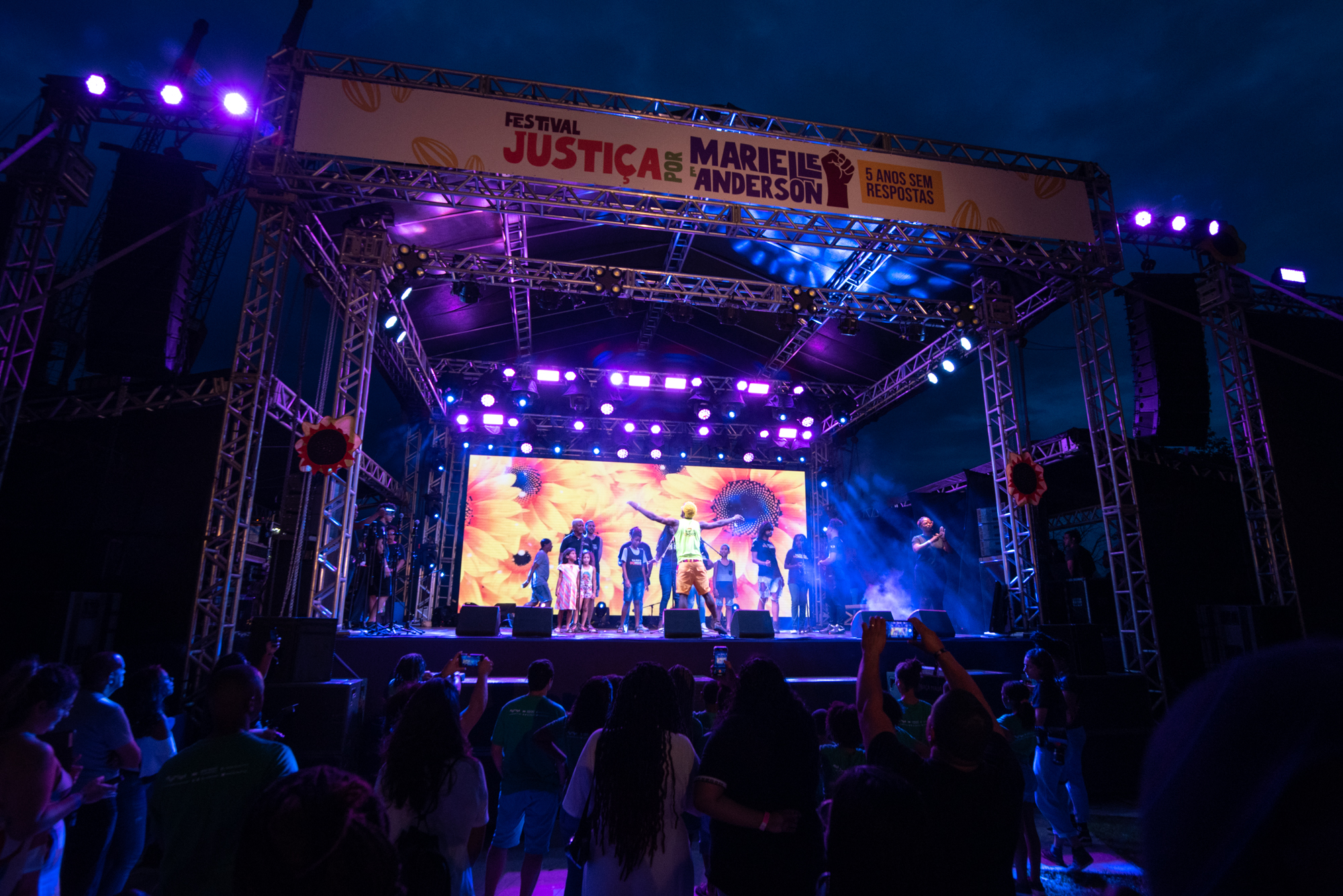
There was significant audience participation at the event, with audience members calling for justice—through t-shirts, flags, posters, or with their own voices. We talked to film and cinema student Ana Luiza, 23, who spoke of the importance of being at the festival.
“I am here demanding justice for Marielle and for all Black women who fight. I’m from Rio de Janeiro and when I found out about Marielle’s death, I was at home and I remember crying a lot because of it. I was 18 years old.” — Ana Luiza
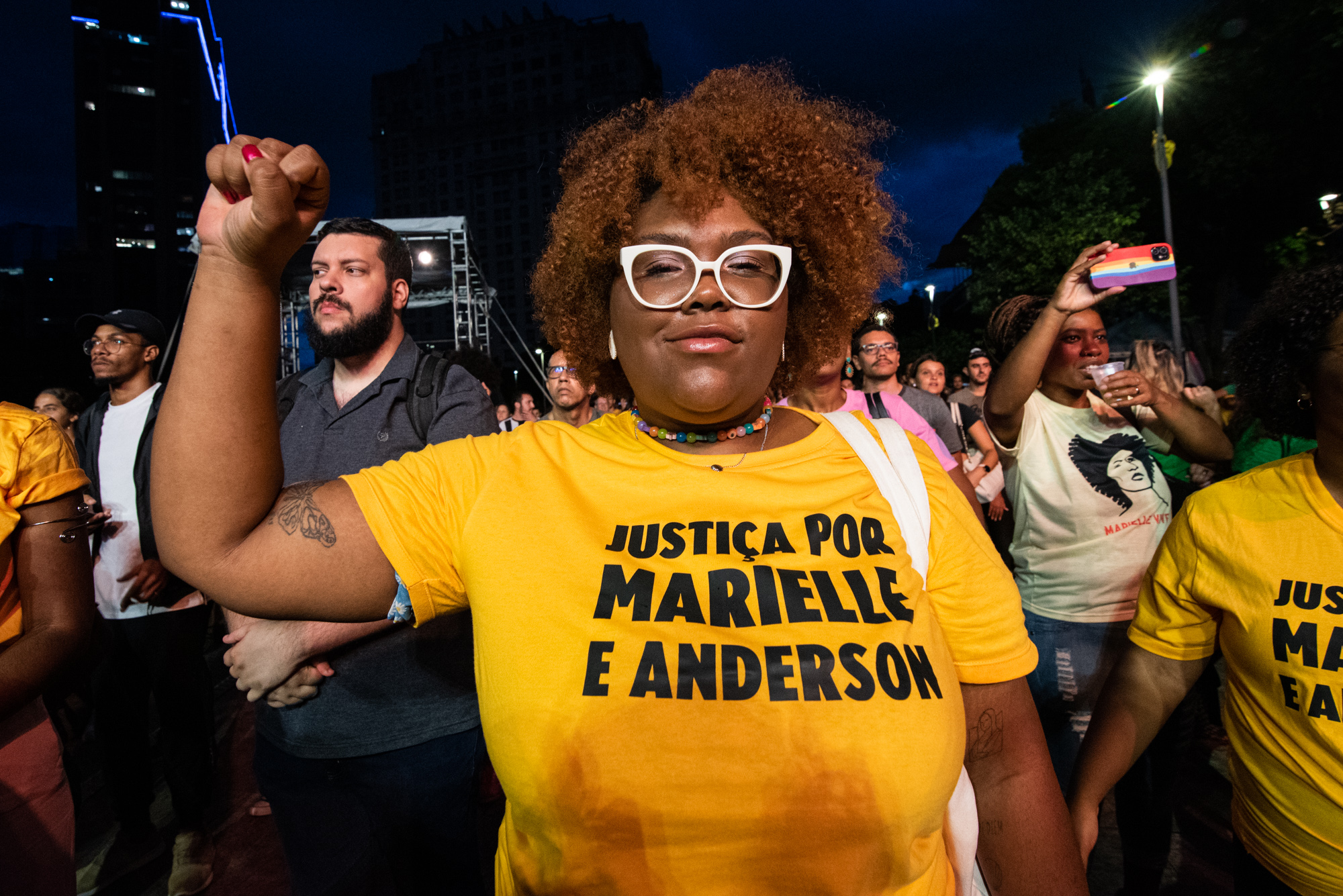
Upon taking the stage, Sami Brasil from Baile Black Bom recalled that Marielle was very present in Rio culture and nothing could be more fitting than cultural movements demanding justice for her.
“Baile Black Bom was born here in the Little Africa region, in the Pedra do Sal Quilombo, filling the streets with Black music and afro-entrepreneurship for ten years. It was in this same territory that we met Marielle Franco, a figure present in the culture of Rio, a figure present in our daily lives of Black activism, and that is why, [because] she is always present, that nothing is more fitting than culture being here today… five years is a long time! So, today we will scream and demand justice for Marielle and Anderson with our art and our power. We demand answers and we want to know who ordered the killings of Marielle Franco and Anderson Gomes?” — Sami Brasil
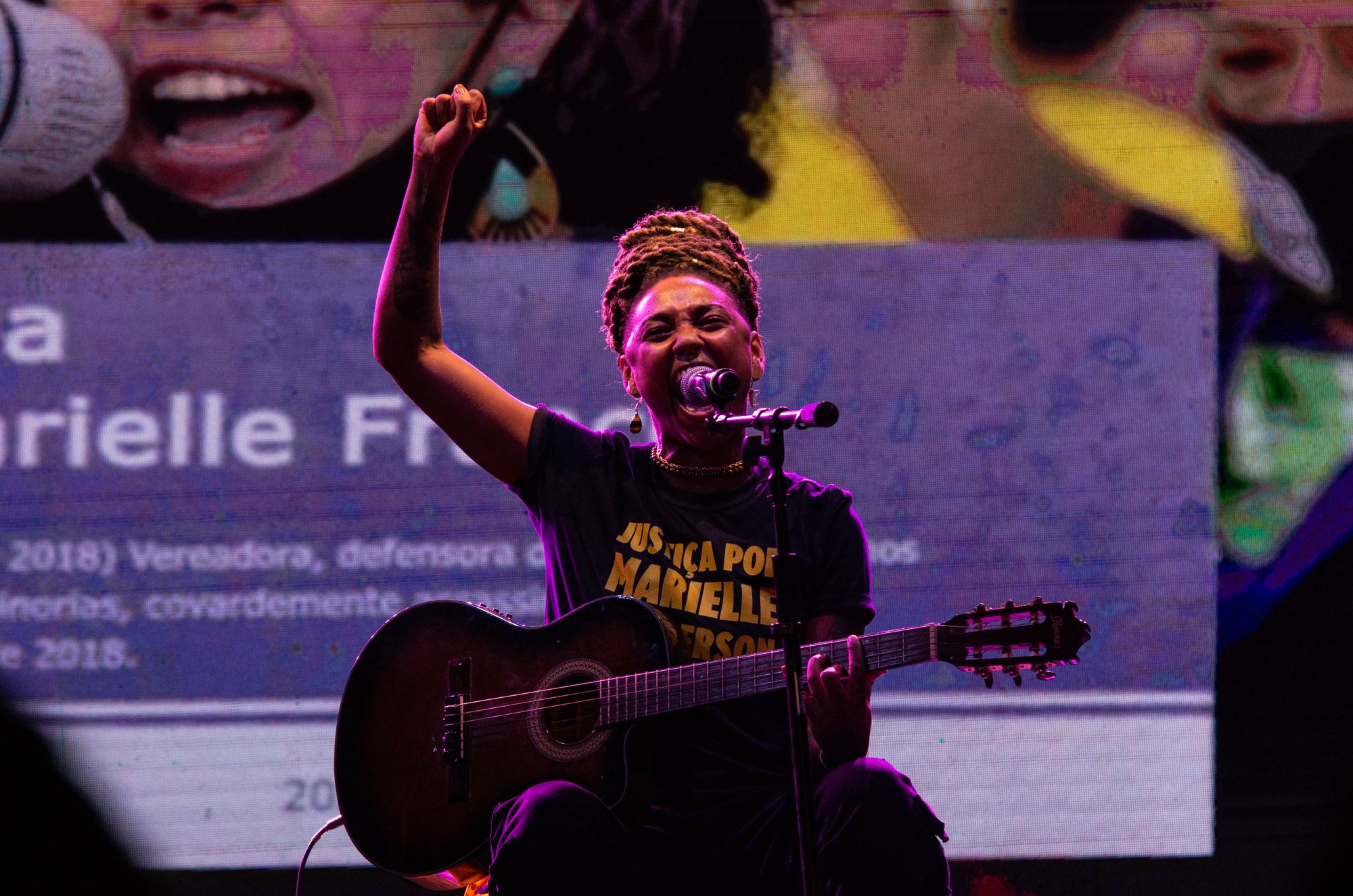
Singer Bia Ferreira also shared her message.
“How long have they been telling our story?
How long have they been constructing our memory?
I came to tell you that just as surely as now,
we will be on the lines that count our victory.
Let us tell our story!
We represent ourselves, we receive the glories,
we learn from each other and, as surely as now,
we will be on the lines that tell our story!
We will not accept being interrupted!
Marielle Franco [is] present!
Say no to racism, say no to prejudice,
say no to the genocide of Black and indigenous people,
say no to racist police,
say no to this fascist militarization…
Say no!
Don’t just watch a lot of people cry while you’re laughing.
Say no!” — Bia Ferreira
Mid-festival, there was a second moment of focus on Marielle and Anderson’s families.
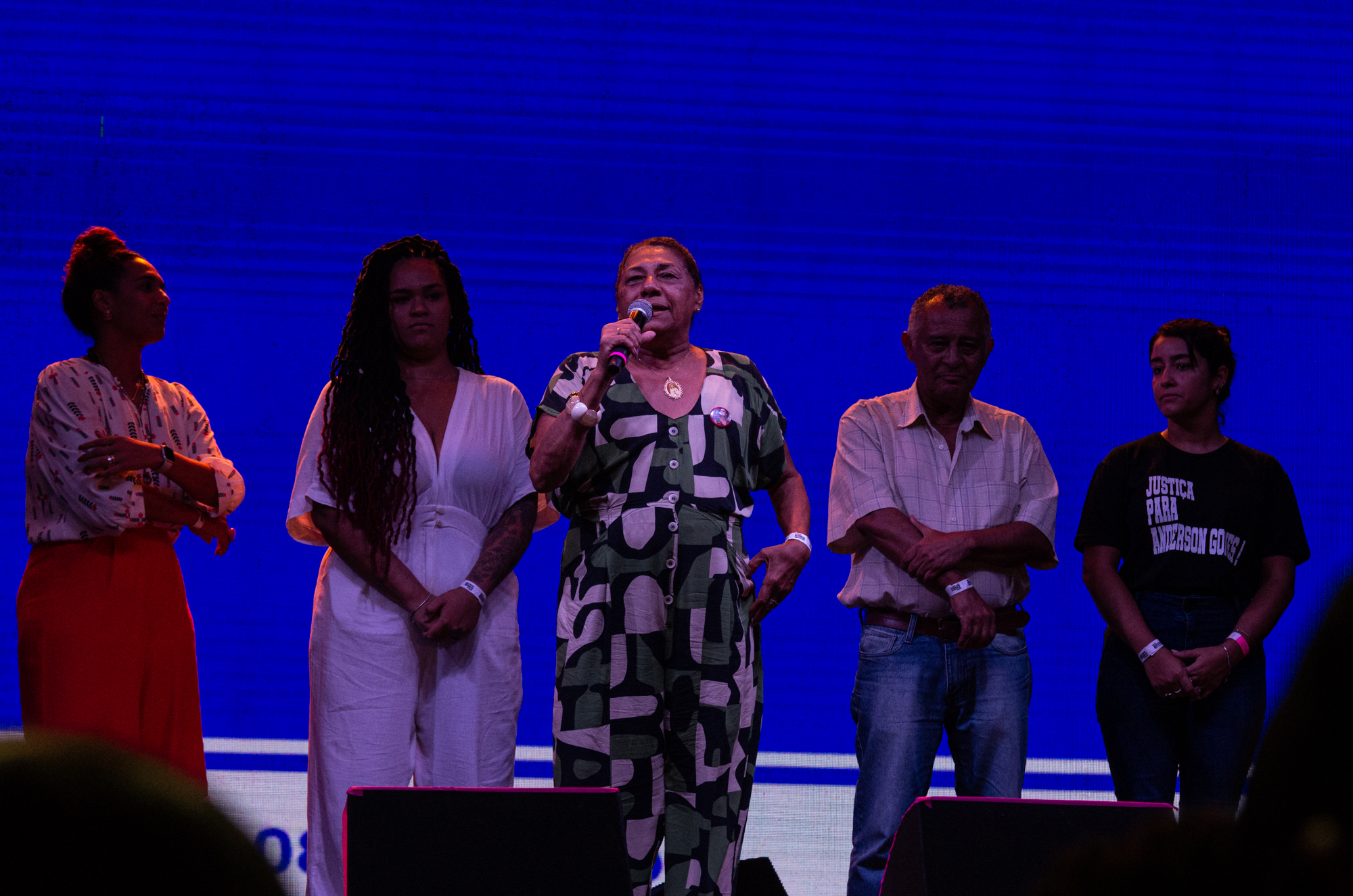
Anielle gave another incisive and affectionate speech, marking these five years without her sister, without Anderson, and without justice. These testimonies—very painful due to the longing and injustice—were incredibly moving to those present.
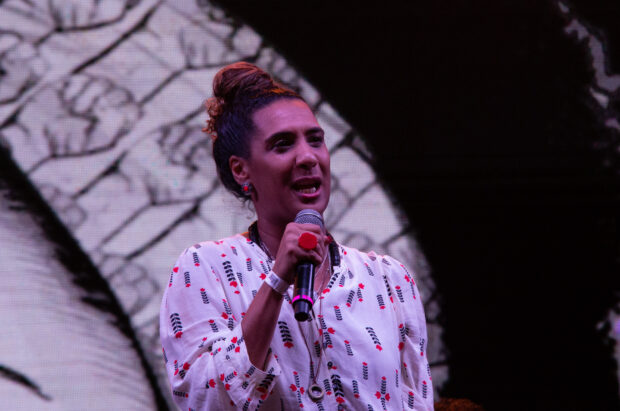
“Good evening everyone. I’ve thought about what to say today. A difficult day, of pain, of struggle, but I wanted to bring you a timeline of what my family and Anderson’s family have been going through. On March 14, 2018, we were at home when we received the call. I was the only person in the family who arrived [in time] to see my sister [dead in the car] with her head open, with five shots. At that moment, I [still] did not understand the full scope of what Marielle had become for many people.
The next day, I arrived at the IML [the coroner’s office] to identify Mari’s body, and, next to her, was Anderson. I kept asking myself: ‘why [did this happen to] our family?’. [Today,] I look at my sister’s story and I have an answer: another politician like Marielle is yet to be born!… And I don’t say this to belittle or diminish anyone, I say this because my sister was involved in politics out of affection. Not an affection to be affected, but an affection that led her to build, eye to eye, which is what we have been doing since [her political femicide]. We come from the same tree, which is my mother, and we owe it all to her. I also owe my aunts and my father.
As long as there’s blood running through my veins, they’re going to have to put up with me fighting to find out who ordered my sister’s assassination, to look in my parents and my niece’s faces and be able to say that we are doing a quality job. The work of moving from grief to struggle, but which is also a work of dedication to Black people, Black women, the LGBTQIAP+ population, and the people of the favela. The Marielle Franco Institute is proof of that… I want to tell you that being at the head of the Ministry of Racial Equality is corrective work. It’s for Marielle’s blood, in memory of Marielle, but also [for all] our construction as Black women from the favela, who believe that we will only have a renewed democracy in this country once we find out: who ordered the killing of Marielle Franco?” — Anielle Franco
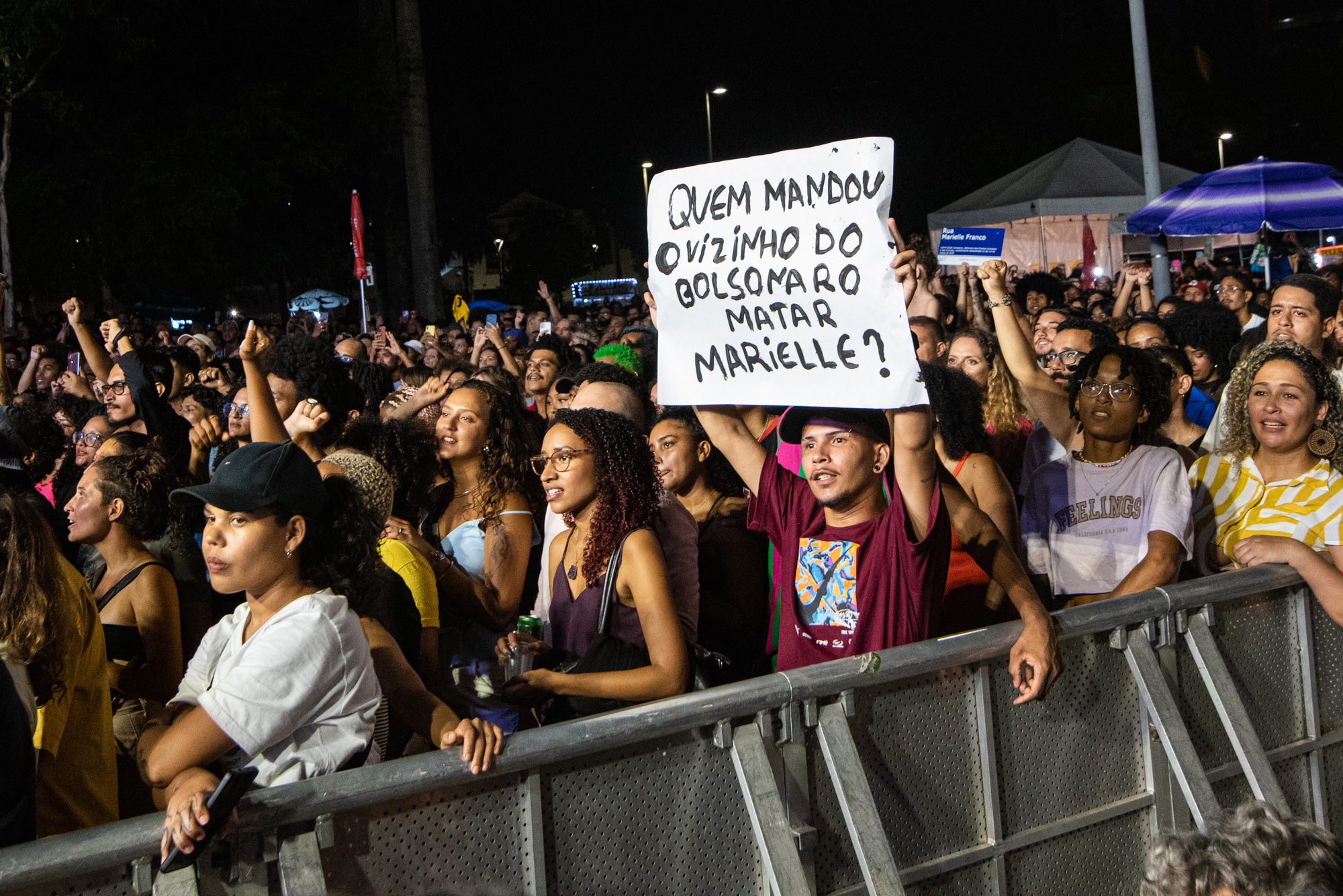
Following the families’ speeches, the festival continued with performances by Criolo, Marcelo D2, Bateria de Mangueira and Marina Iris, Shury, Abronca, Deize Tigrona, and ended with Djonga. The five years with no answers and even negligence by authorities and governors in the investigations have served to reinforce Marielle as a symbol of the fight for social justice, human rights, for the resistance of Black women from the favelas and urban peripheries. Her ideals continue to inspire people around the world. Nothing, not her death, nor the State’s neglect in investigating the assassination, will erase Marielle Franco’s memory. She was and is because we are. Our steps have come from far and Marielle lives!
See more photos here from the Justice for Marielle and Anderson Festival:
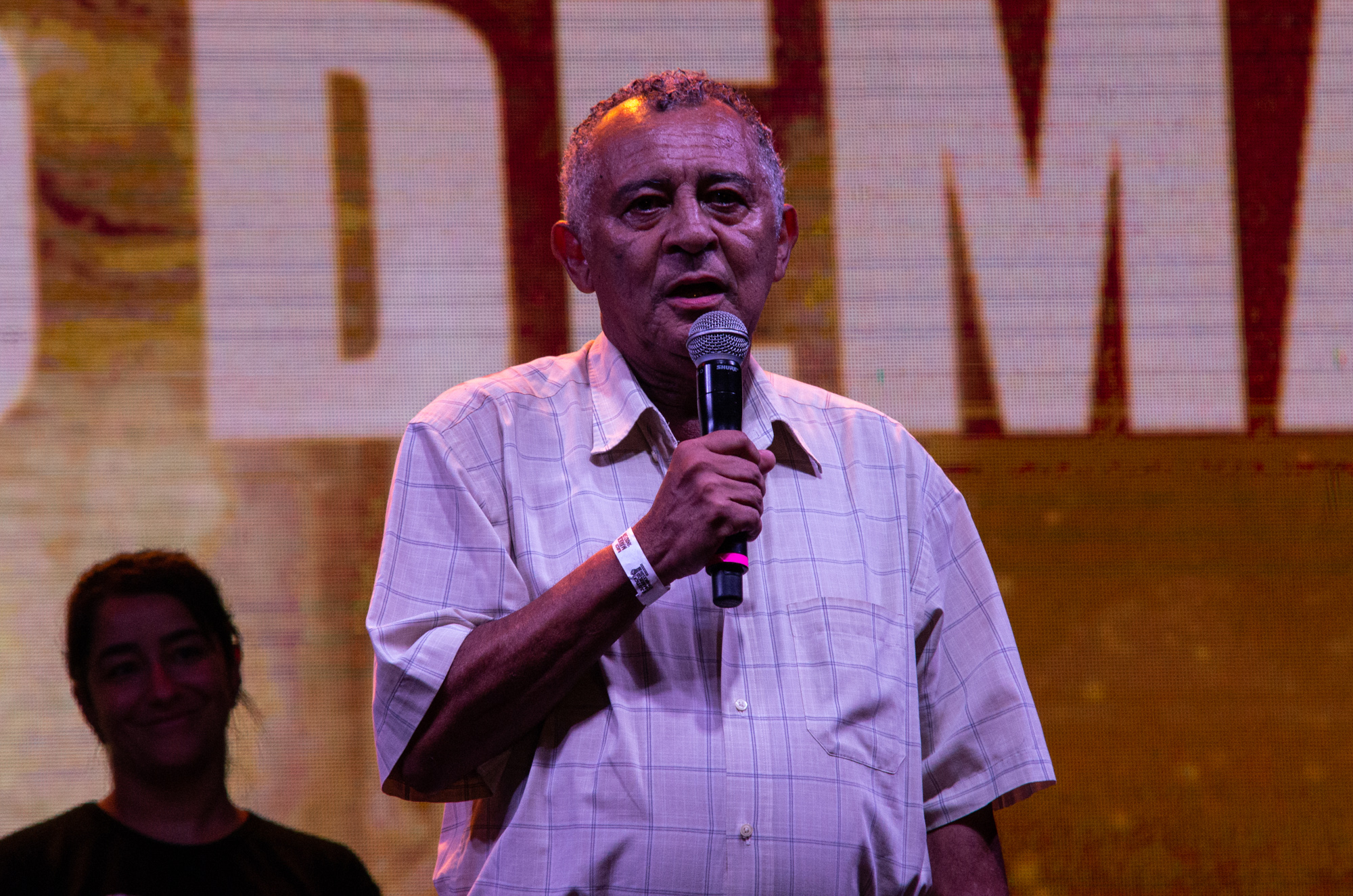
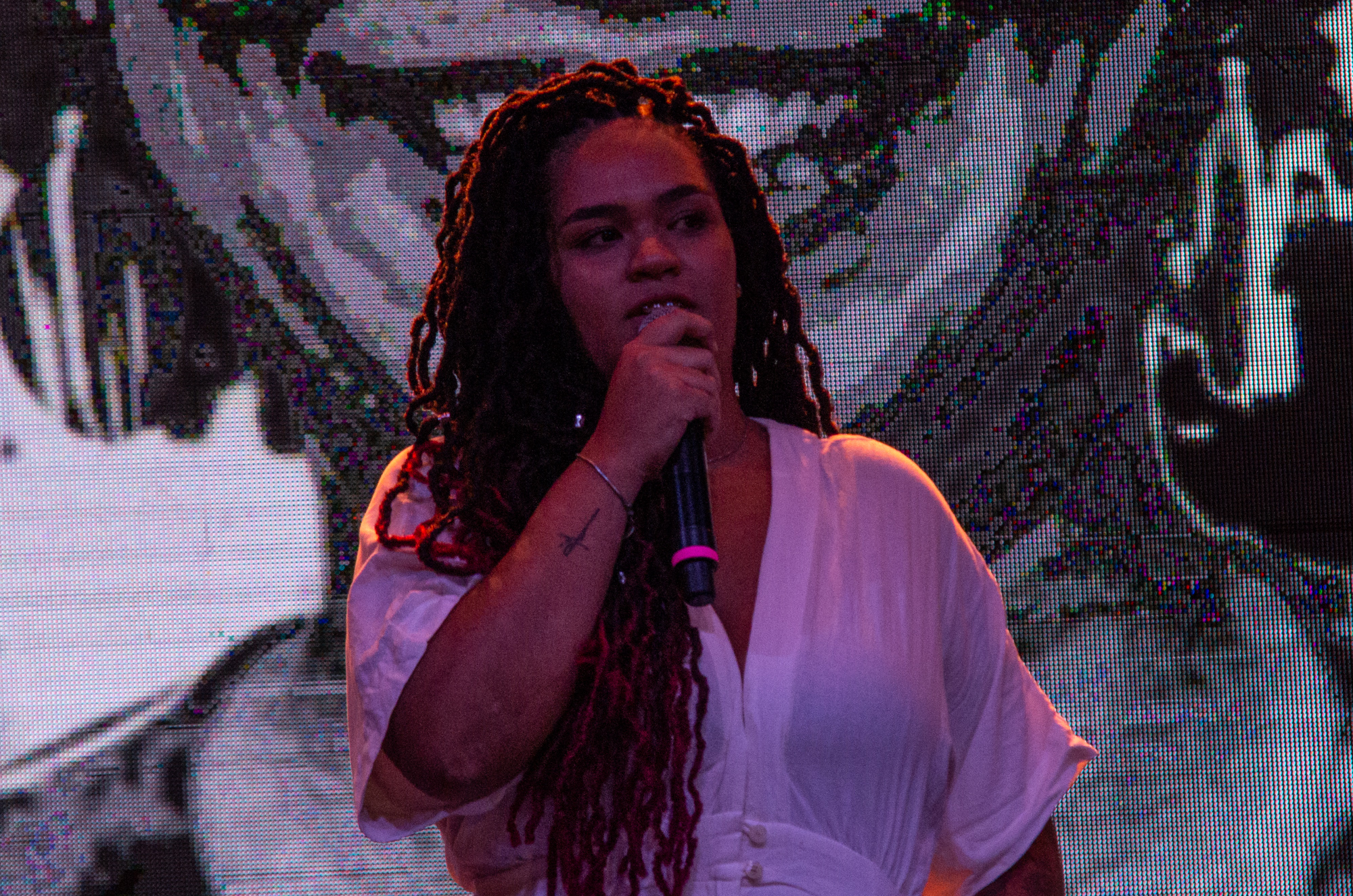
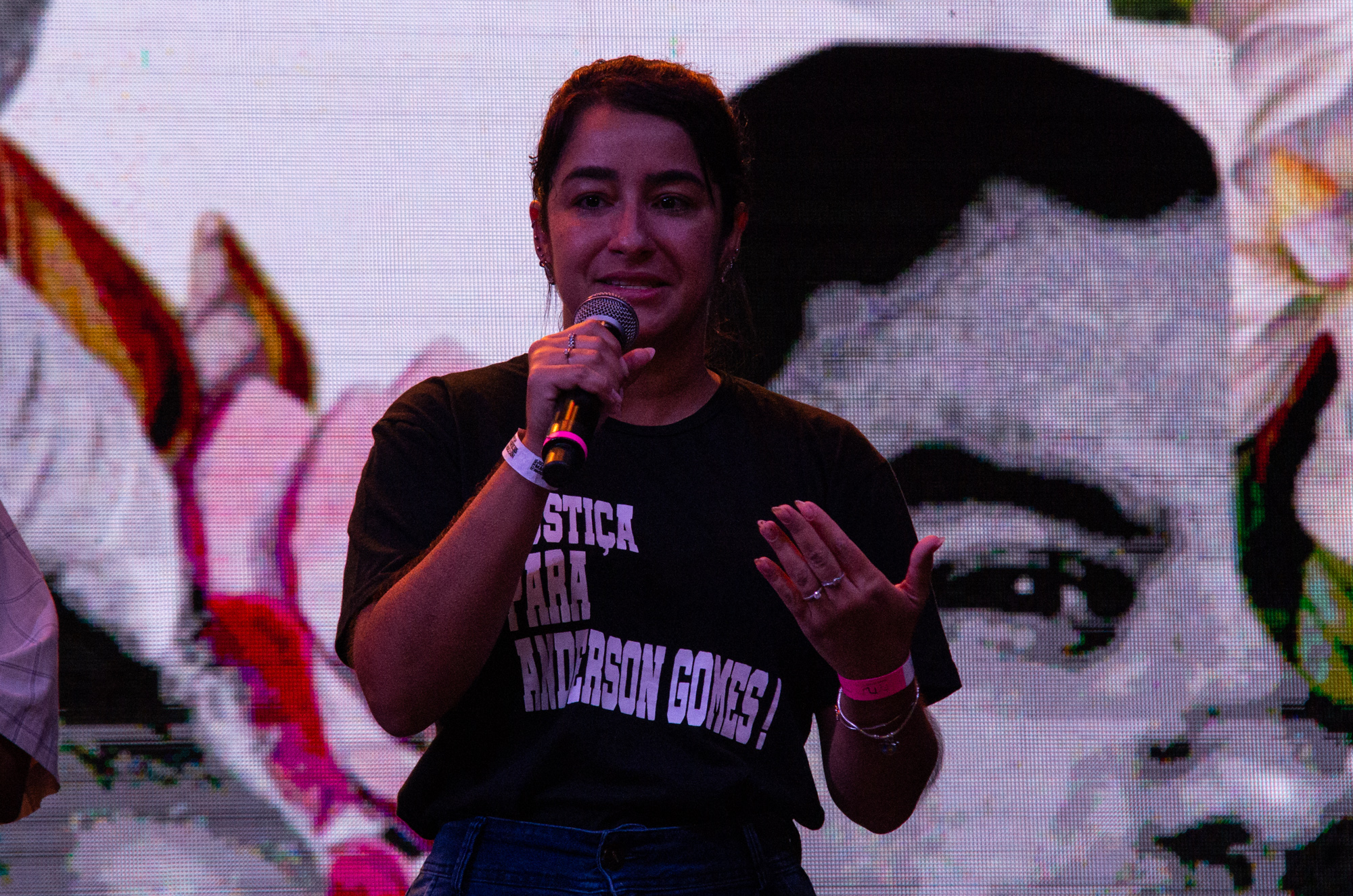
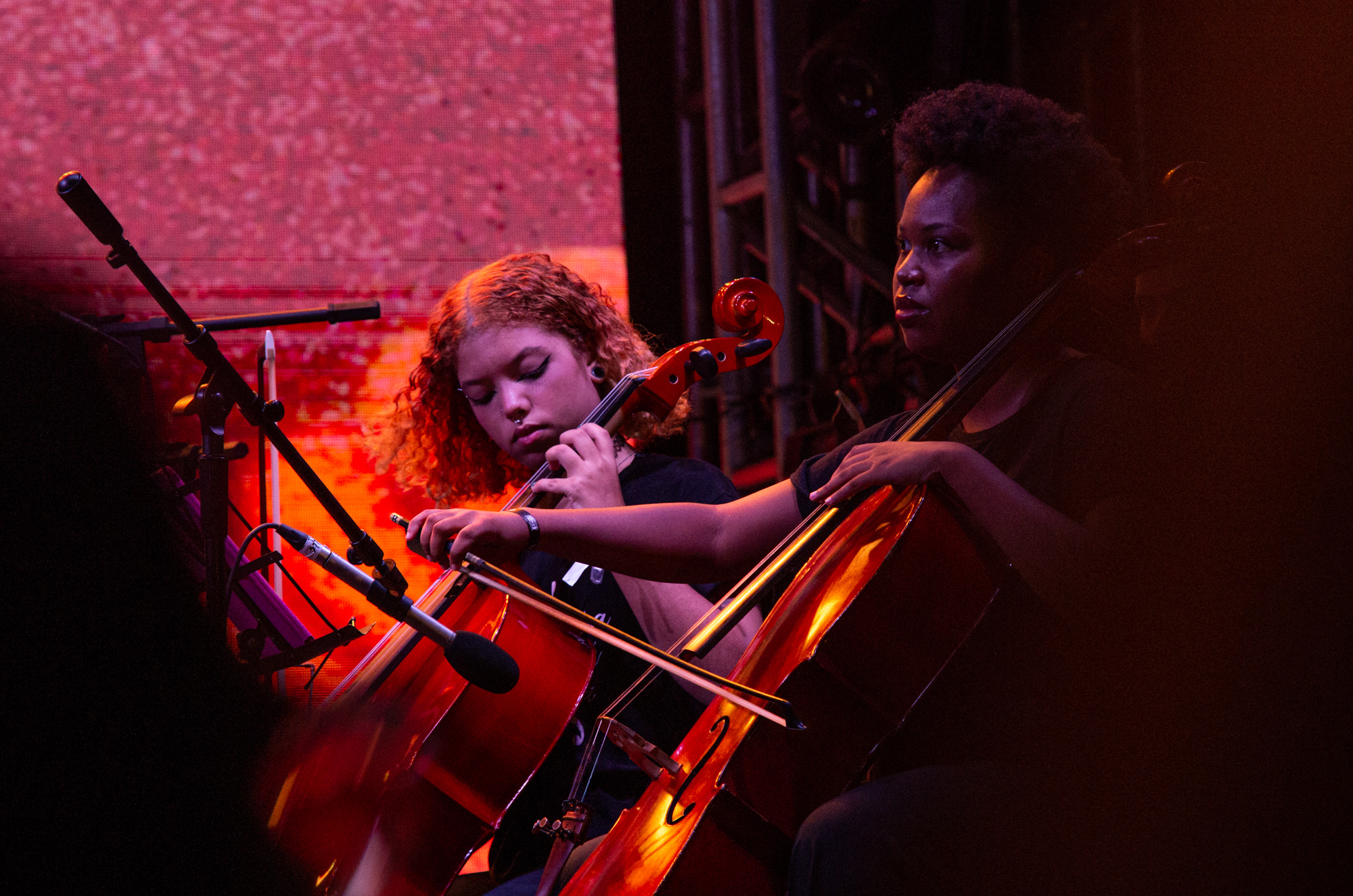
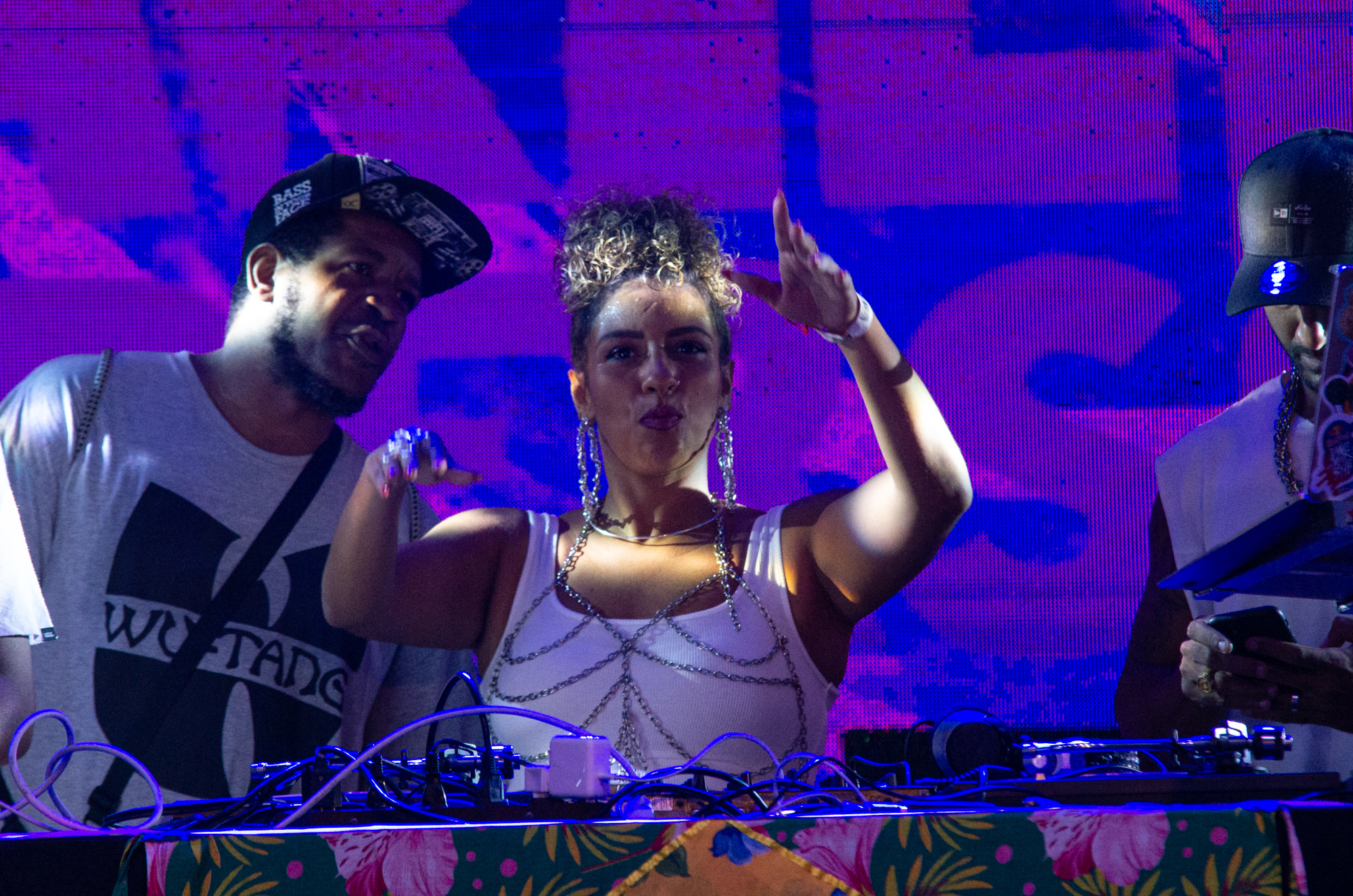
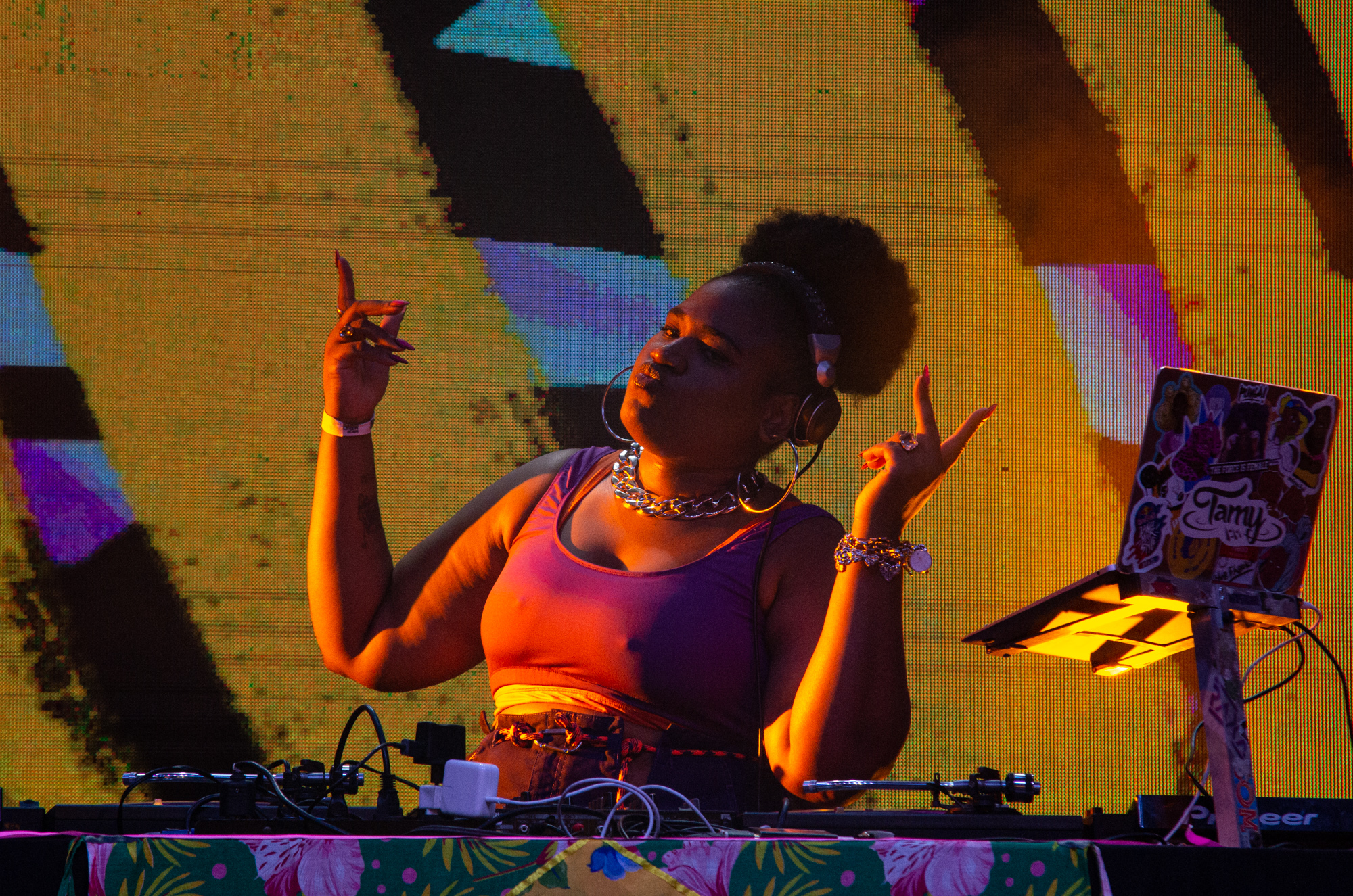
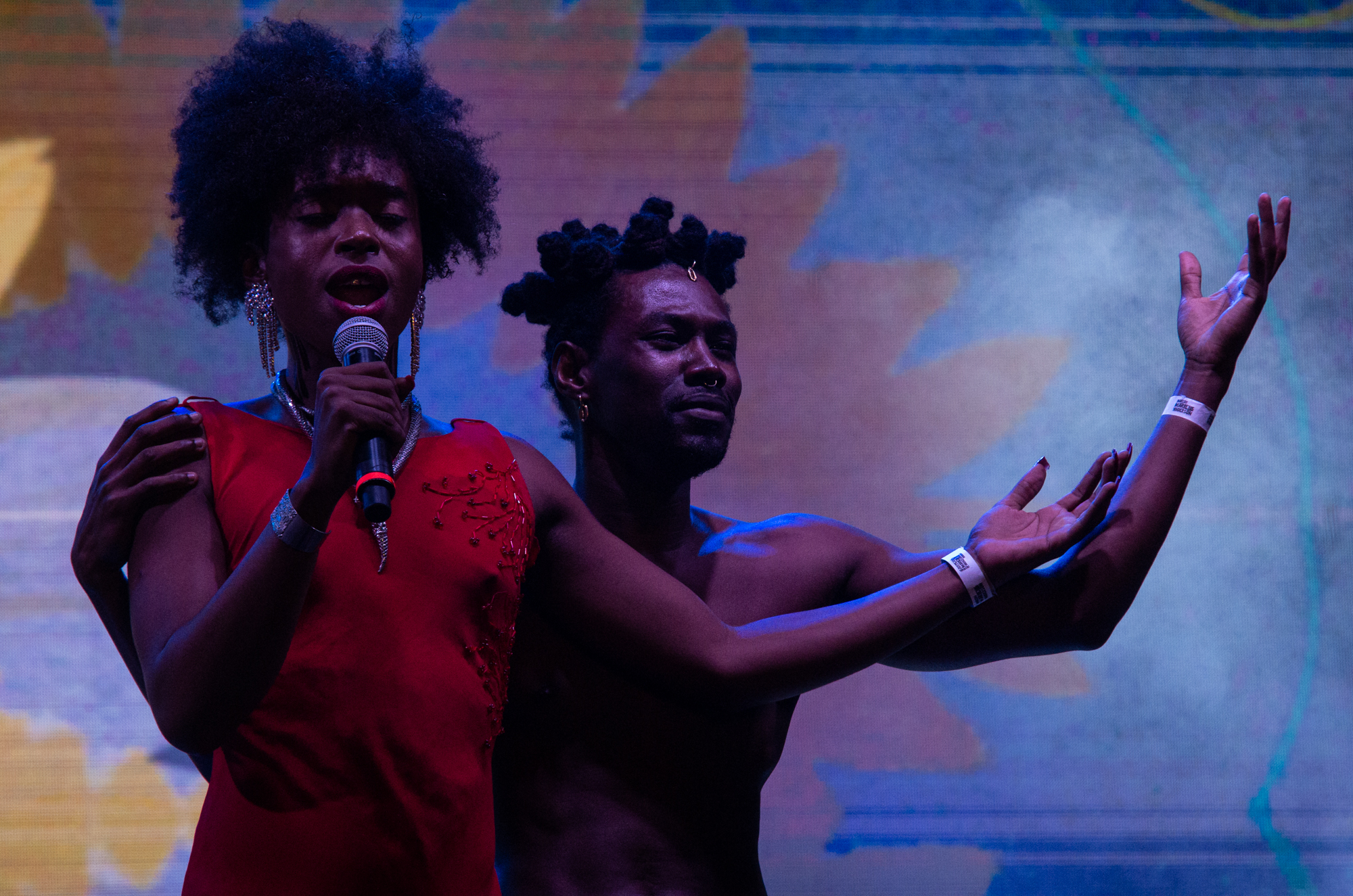
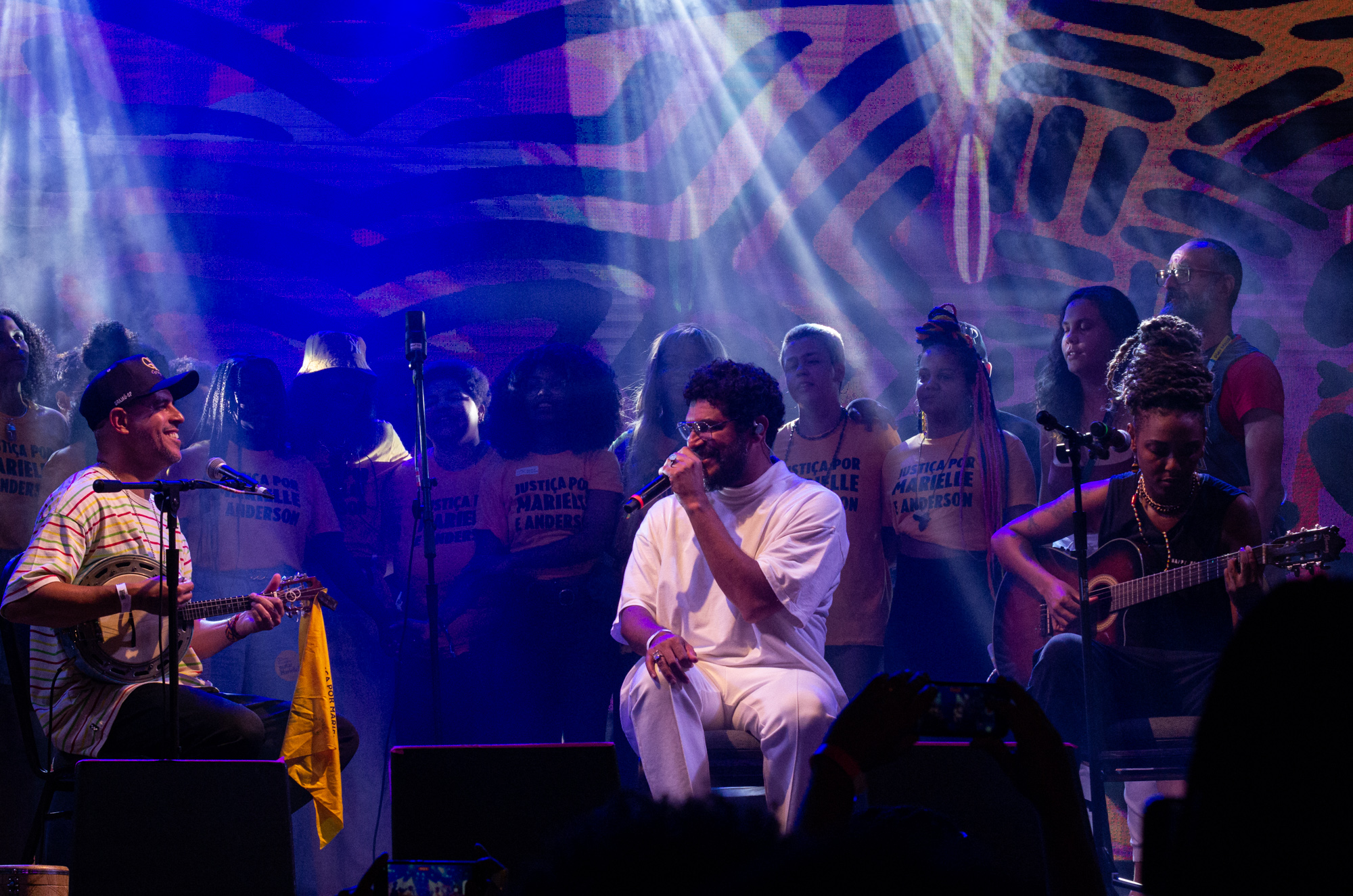
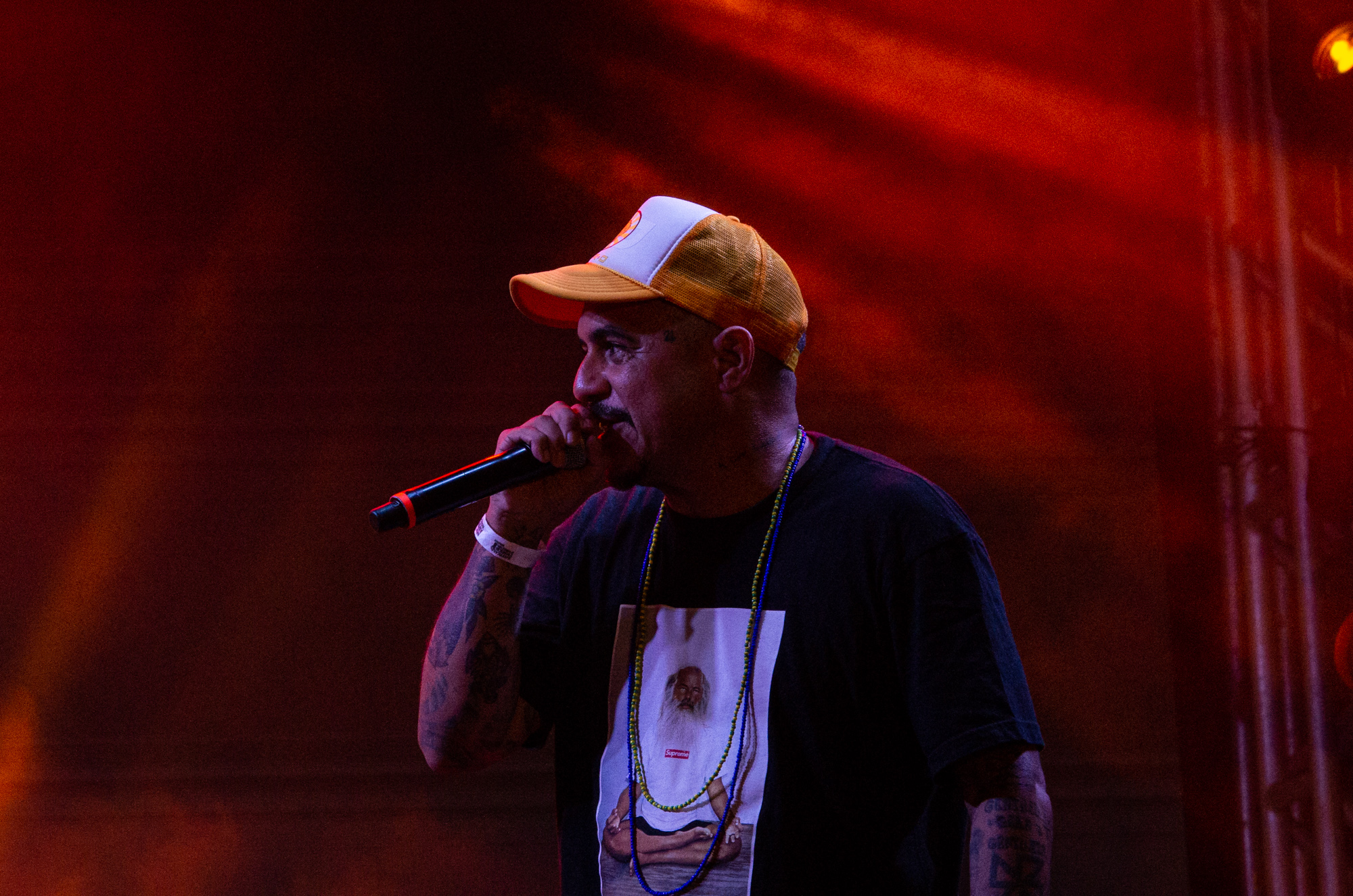
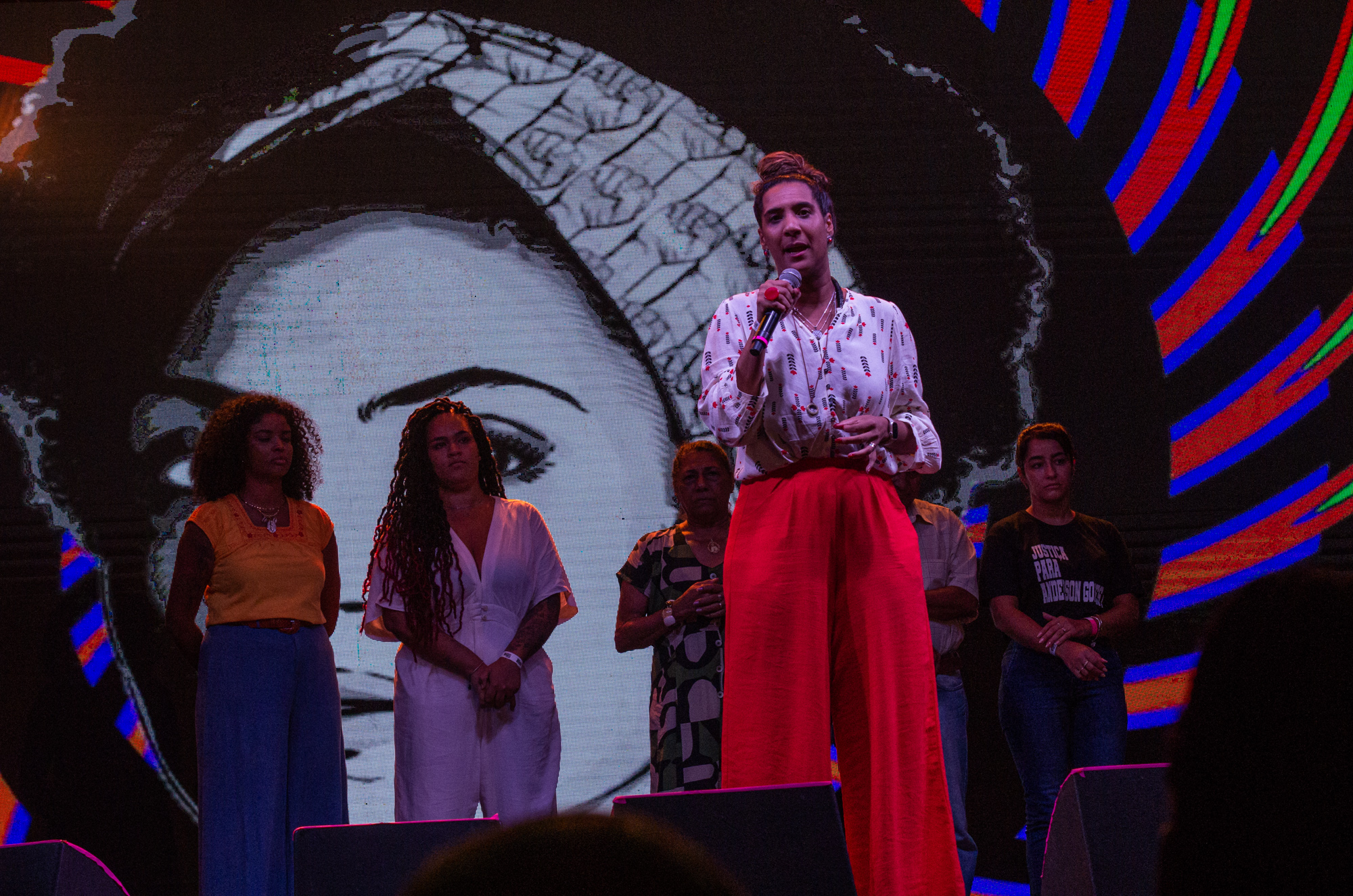
Watch the recording of the Festival Justice for Marielle and Anderson here:
About the author and photographer: Bárbara Dias was born and raised in Bangu, in Rio’s West Zone. She has a degree in Biological Sciences, a master’s in Environmental Education, and has been a public school teacher since 2006. She is a photojournalist and also works with documentary photography. She is a popular communicator for Núcleo Piratininga de Comunicação (NPC) and co-founder of Coletivo Fotoguerrilha.
